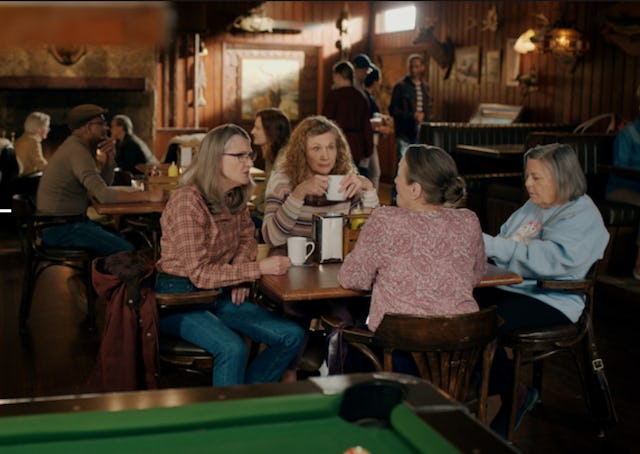The One Scene From ‘Virgin River’ That Had Me Conflicted As A Woman With MS
Season six of the hit Netflix show highlighted women’s need for female camaraderie. But they forgot many of us.

I’m a huge fan of the Netflix show “Virgin River.” I’ve watched every episode, and I’ve concluded that every new mother – especially one like me who has a chronic illness – needs a place like the fictional town of Virgin River. Its residents find themselves among extended family ready to provide support physically and emotionally and to fight their battles alongside them.
From the moment the show’s female lead Mel arrived in Virgin River, hoping to escape the heartache from her past, the community overwhelmingly made her feel at home. A whole cast of characters are there to help her find everything from a job at the local medical clinic to a home.
Blissfully, and unlike what we Americans too often experience, anyone fighting a medical battle in Virgin River is given the time and help they need no matter the cost. Doc and Mel make home visits or tend to their patients roadside, even placing their own lives at risk. But it’s the tight knit friendships and the common desire to be present and to make a difference in one another’s lives that make this place seem too good to be true. No one is alone in Virgin River.
As I started streaming season six right before the holidays, I only longed more deeply for the small-town vibes of this magical community. There was one scene I was drawn to most — but I found myself conflicted, loving the message and despising it all at once.
In the beginning of the season, Muriel discovers a lump in her breast and has a biopsy. In episode eight, she reveals the results to her friends, and they respond by sharing the medical conditions – from hypothyroidism to bunions to diabetes – they battle daily. As they chimed in to lessen Muriel’s fear, I found myself wishing that every woman had friends like this. .
Yes! I thought, so happy to see a show highlight that we all live in a human body, imperfect and capable of becoming ill. As Muriel’s friends offered words of support, the show acknowledges that women need other women surrounding them when the going gets tough. We crave empathy, and most of all to know we’re not alone. But then Jo Ellen, who is roughly in her 60s, said, “The point is, we are women of a certain age, and we all have our things. But we also have each other.”
Suddenly, those four words — of a certain age — changed the message of this almost perfect scene. As a 41-year-old woman who has been battling multiple sclerosis since I was 21, I felt excluded when these four words rolled off Jo Ellen’s tongue.
On the one hand, their unwavering compassion was everything I’ve always needed as a woman with chronic illness. I lost out on what should have been the best years of my life — my 20s — searching for a diagnosis. I spent my 30s continuing that search and then adjusting to immunosuppressive treatment and accepting a lifelong, progressive disease. The few friends who stood by me made all the difference, but a circle of female camaraderie was everything I needed in my darkest moments.
The more I described my anonymous disease to friends, the farther I felt from them. Without a diagnosis, I struggled to explain the heaviness that hung from my shoulders and the weakness that consumed my strength. Most friends couldn’t understand why I socialized less or why my smile was forced at times and so I was left to face my disability and my fears alone. Even once I received my official diagnosis, the support that sustained me was mostly from family. Being surrounded by women like Muriel’s friends would have softened the impact of this disease. It was something I longed for in my 20s and still need now in mid-life.
On tough days when fatigue smothers me and my legs struggle to carry the weight of my body, one sentiment keeps me going: Everyone is fighting their own battle. From mental health disease to genetic conditions to autoimmune disease to cancer, I genuinely do believe every woman is facing her own struggle. And I don’t think age has anything to do with it.
I wish Jo Ellen had omitted those four words and simply said, “The point is, we are women, and we all have our things. But we also have each other.” This would have included all of us–it would have stated the truth.
That scene was spot on in exemplifying the robust feminine community women of all ages need — a camaraderie often illustrated beautifully in Virgin River. But it left out women in early adulthood and mid-life. Virgin River forgot about those of us in the prime of our lives. We’re raising children, following dreams, and combating disease — some of us, all at once.
We fight battles, and we need one another too.
Lindsay Karp is a freelance writer with a background in speech-language pathology. She writes about parenting, life with MS, and everything in between. Her work has appeared in The Cut, TIME, Salon, Newsweek, Insider, and other outlets. Follow Lindsay on X @KarpLindsay.